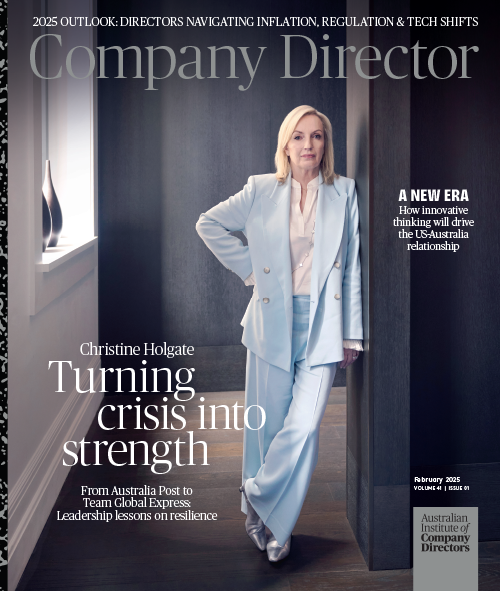In an environment of increasing uncertainty and potential global upheaval, directors need to be developing foresight and planning for the long term.
When asked if they would’ve liked prior warning of the COVID-19 pandemic, most directors in my experience have answered in the affirmative. However, perfect hindsight doesn’t equal prudent foresight. Asked how many of their organisations now had processes to evaluate similar future shocks, more than 75 per cent said they had nothing.
At the same time, there is reduced capability in government to address this operating environment. A 2021 OECD report highlighted that: “Governments, in general, do not appear to have developed the institutions, processes and practices to focus on the long term... This will inevitably weaken their ability to identify challenges and risks, or to mitigate and manage those risks, let alone to contribute to strong and resilient future economies and societies”.
The lack of private sector processes and poor government capability should concern directors, because more shocks are looming. Global warming, a decline in democracy, fast-moving technologies and rising geopolitical tensions will create cascading and overlapping impacts.
To further compound the issue, the non- obvious impacts usually create the most challenges. To illustrate, consider the example of the pandemic. For many organisations, the immediate health issues paled in comparison to the resulting supply chain chaos. So, how should directors approach this operating environment?
Coping with crisis
First, don’t let your strategic horizons drift back into comfortable, pre-pandemic thinking. To paraphrase Winston Churchill, don’t waste a crisis. Directors should be challenging management to get above strategy and consider how to respond to various issues. For example, organisations with significant exposure to the US market should actively explore scenarios focused on the upcoming presidential election. What happens in America won’t stay in America.
Second, avoid the temptation to create forecasts when going through the process. Making accurate predictions about the future is impossible. So instead, you should use structured foresight processes to create a list of the right questions. This list should be the starting point for further strategic analysis. The caveat is that some of the questions may be unanswerable. However, creating the list often highlights where dicult conversations need to occur.
Finally, don’t treat this process as a one-off exercise. Forward-thinking directors should aim to create ongoing foresight competence in the organisation, where strategy isn’t simply a two-year projection of the previous year.
This is more challenging than many people expect, as evidenced by the January 2020 edition of the WEF Global Risks Report, which did not include a pandemic among its top 10 risks for the next 10 years. On my bookshelf, that report is now filed under “Failure of Imagination”.
In summary, get above strategy to ask the right questions and actively build foresight expertise. When organisations combine these capabilities, they are better equipped to deal with volatility.
Training to adapt
In 2008, I was engaged by the CEO of a large healthcare organisation to analyse the impact of “cracks appearing in the system” in the coming years. Our team created scenarios around three central themes — reduced levels of health infrastructure spending, increasing demand for healthcare from an ageing population, and a decreased workforce (also from an ageing population). We brought these scenarios to life by converting a 3000sqm warehouse into a hybrid corporate roadshow/interactive museum that showcased key themes from the various scenarios. Employees visited the exhibit and learned first-hand about the challenges and opportunities ahead. This initiative formed the foundation of a transformation program in the organisation and led to widespread changes in the way people worked.
Then, in 2011, major earthquakes hit the region, causing tragic disruption. In less than 60 seconds, there was compromised healthcare infrastructure, increased demand and a reduced workforce. The three core pillars of the scenarios emerged in a way that was never anticipated. Despite the chaos, the organisation outperformed its peers on key metrics only weeks after the disaster.
When its CEO was interviewed about how such an outcome was possible, he responded that the organisation had been actively adapting to potential future changes and the earthquakes were a reason to move faster.
Continuous curiosity
At the 2023 AICD Australian Governance Summit, Australian Securities and Investments Commission chair Joe Longo stressed that certain fundamental principles should be on every director’s mind. Included in his list was the need to have a continuous curiosity in understanding the reasonably foreseeable non-financial risks posed by that business and the need to challenge management to ensure the foundation of that understanding.
Longo may not have been thinking about the impact of a global polycrisis on Australian organisations when he made those comments, but he was prescient with his advice. Directors need to urgently consider non-financial risks at the highest level. There’s no point in building the fire station after the fire has started.
Roger Dennis is a founder of boutique advisory Dennis & Partners, which enables leaders to get above strategy to realise opportunity and mitigate risk. In 2015, he led a team analysing the impact of a pandemic on the world, concluding supply chain chaos was inevitable. His thinking has been published in Scientific American, Financial Times and CNN Online, among others.
This article first appeared under the headline 'Out of the Comfort Zone’ in the July 2024 issue of Company Director magazine.
Latest news
Already a member?
Login to view this content



